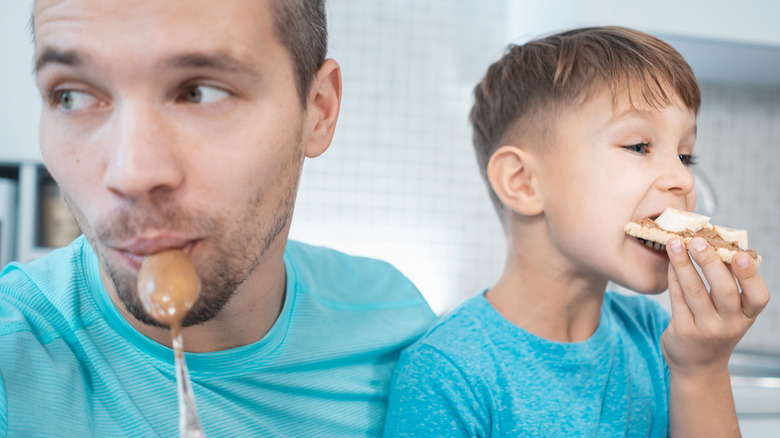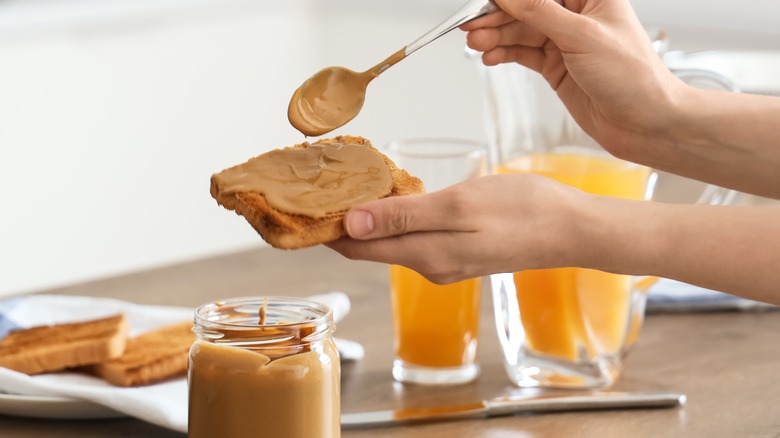Eating Peanut Butter Has An Unexpected Effect On Your Prostate
It's a given that every man should be concerned with their prostate health, due to the fact that only men have this walnut-sized gland (per WebMD).
According to Harvard Health Publishing, there are three main prostate-related conditions that men should watch out for: prostate cancer, which has the possibility to affect not just the prostate, but other areas of the body as well; prostatitis, which is inflammation of the gland that may cause painful urination; and benign prostatic hyperplasia (BPH), which others simply call an enlarged prostate. All men experience prostate growth over the years, but not all encounter medical complications. A man's risk of unhealthy prostate growth increases as he grows older. There is a one in 12 risk of developing the condition after the age of 30; the risk rises to 50% at age 51, and after 80 years of age, the risk of developing BPH exceeds 80%.
Prostate enlargement becomes a problem when it causes compression of the urethra, leading to frequent (typically nighttime) urination and challenges in maintaining a consistent urine stream and fully emptying the bladder. Interestingly, an unexpected way to potentially alleviate these uncomfortable symptoms is by incorporating a breakfast favorite into one's diet: peanut butter.
The unexpected compound in peanut butter that may protect against BPH
The key reason why peanut butter can help with alleviating BPH symptoms lies in beta-sitosterol, which is a type of plant-based, cholesterol-inhibiting compound called phytosterol (per the Cleveland Clinic). As explained by Mount Sinai experts, beta-sitosterol, which is touted for its cholesterol-lowering abilities, may also benefit people with BPH. Research has shown that while beta-sitosterol does not reduce prostate size, it can not only facilitate more thorough emptying of the bladder, but also ensure consistency in the flow of a person's urine.
In a 2000 study published in Nutrition and Cancer, researchers took note of the amount of phytosterols in peanuts and peanut products, prompted by evidence that the compounds can potentially protect against breast, colon, and prostate cancer. They found that 100 grams of roasted peanuts can contain between 61 and 114 milligrams of phytosterols, up to 83% of which is beta-sitosterol. In comparison, the same amount of peanut butter can have up to 157 milligrams of phytosterols; given that peanut butter accounts for approximately half of Americans' peanut consumption, this makes the spread an excellent beta-sitosterol source.
Can peanut butter be bad for prostate health, too?
Peanut butter may benefit individuals with BPH, but can bad things also happen to your prostate if you eat way too much of it? As it turns out, the answer is yes.
According to a 2019 study published in Prostate Cancer and Prostatic Diseases, there is an association between eating peanut butter and a "significantly increased risk" of non-advanced prostate cancer [...] but not with total or advanced prostate cancer." Experts at the University of California San Francisco Health stress the importance of nutrition in mitigating one's prostate cancer risk and progression, with particular focus on a plant-based, high-fiber, low-fat, and low-sugar diet. Unfortunately, while it's undeniable that peanut butter is packed with nutrients, it, like other nut-based products, also comes with a hefty amount of fat. It's worth noting that, per WebMD, BPH itself is not a precursor to prostate cancer.
Ultimately, it's wise to consult a health professional before making the decision to eat peanut butter every day, especially if it's for your BPH. (With that said, there are some fascinating benefits to eating peanut butter as you age.)



